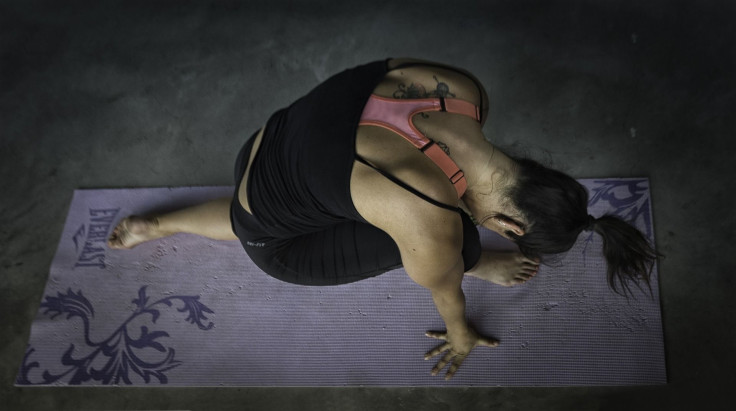Canadian Yoga Class For Students With Disabilities Cancelled Due To 'Cultural Appropriation, Oppression'

Jen Scharf, a yoga instructor who ran a free yoga class at the University of Ottawa for students with disabilities, was surprised to receive an email noting that her class would be discontinued this fall.
The class was held at the Centre for Students with Disabilities, run by the school’s Student Federation, nearly every week for seven years. Scharf described it as a good way for students to come together for an hour to stretch and move their bodies — both of which are things important for well-being. So she was taken aback by an email from a Student Federation representative that noted the class would be cancelled, due to the fact that several members of the federation had been offended by Westernized yoga's "cultural appropriation."
"I think that our centre agreed … that while yoga is a really great idea, accessible and great for students, that there are cultural issues of implication involved in the practice," the representative wrote, according to the Washington Post. "I have heard from a couple students and volunteers that [they] feel uncomfortable with how we are doing yoga while we claim to be inclusive at the same time."
The representative, who Scharf didn’t want to name, continued to note that yoga is inherently tied to the history of India — a country that has experienced oppression and colonialism from the Western world.
"Yoga has been under a lot of controversy lately due to how it is being practiced and what practices from what cultures (which are often sacred spiritual practices) they are being taken from," the rep wrote. "Many of these cultures are cultures that have experienced oppression, cultural genocide, and diasporas due to colonialism and Western supremacy, and we need to be mindful of this and how we express ourselves and while practicing yoga."
Indeed, yoga has historically been an Indian spiritual practice, spanning thousands of years and holding an important place in Hinduism, Buddhism, and Jainism. It may not be a religion in and of itself per se, but because there have been thousands of different interpretations of the practice since ancient times, it’s important to be aware that some people do practice it as a religion. From their point of view, then, it must be jarring to see Westerners sell it as a secularized business — as a version that is entirely different from its original form.
As with many topics that require mindfulness and often “political correctness,” it’s a complicated debate. Indeed, a country still healing from the wounds of oppressive colonialism — in which the British claimed Indian land, government, and culture as their own — might cringe at a Lululemon-clad suburban white girl clutching her yoga certificate and claiming their spiritual practice as her own, without any real understanding of it.
At the same time, yoga was brought to the attention of the Western world primarily by Hindu yogis themselves who hoped to spread the practice. Swami Vivekananda, a Hindu monk who visited Europe and the U.S. in the 1890s, was the primary teacher to introduce hatha yoga and the Yoga Sutras to Westerners; several other Hindu teachers followed suit. Many of these teachers believe yoga is a beautiful practice that can only improve the lives of those who use it — even if they’re not Hindu or Indian.
Scharf, who didn’t want to give up but also aimed to remain self-aware about the issue, responded to the e-mail with her own idea. She noted that she had never wanted to “culturally impose anything,” and that her students simply felt good after doing it.
“I told them, ‘Why don’t we just change the name of the course?’” she said, according to CBC News. “It’s simple enough, just call it mindful stretching. … We’re not going through the finer points of scripture. We’re talking about basic physical awareness and how to stretch so that you feel good.”
The Student Federation initially seemed open to the idea, but Scharf noted that their correspondence “went back and forth. … Finally we got an email routed through the student federation basically saying they couldn’t get a French name and nobody wants to do it, so we’re going to cancel it for now.”
She’s hoping to bring a more “inclusive” and accessible class back at some point, but has yet to figure that out. In the meantime, many people are calling out the University of Ottawa Student Federation for taking political correctness too far; but if anything, it opens up a conversation about how we practice yoga.
There are, of course, some Hindus who are fighting against the commercialization of yoga in the West. Take the Hindu American Foundation, for example, who argue that with the rise of the multi-billion dollar yoga industry, the “underlying meaning, philosophy, and purpose of yoga” are lost.
But other Hindus who have been practicing yoga for their entire lives aren’t offended by its rise in the Western world; some embrace it and see it as a way to learn and share the love.
“When I saw what was happening [with big crowds for free yoga] on Parliament Hill I was thrilled and probably a little bit ashamed that my body wasn’t as flexible as theirs,” Dilip Waghray, a member of the Hindu Temple of Ottawa-Carleton who has practiced yoga for 50 years, told CBC News. “I said, ‘Wow,’ and the first thing I did was share with my classmates back home. If you look at what the Western world has adapted it is just phenomenal. Imagine how much good they’re doing for themselves. They’ll live a long and very happy life.”
Published by Medicaldaily.com



























